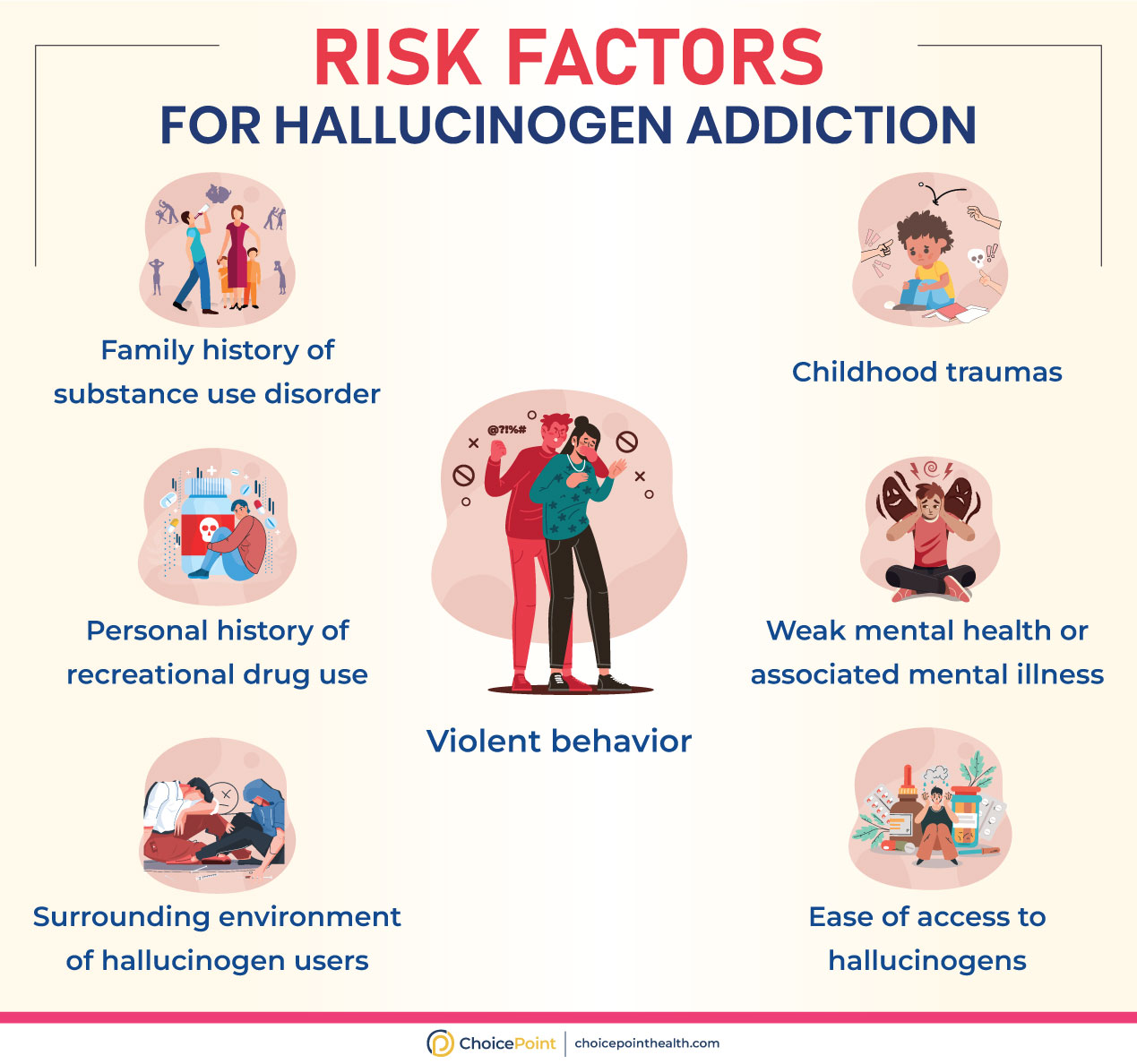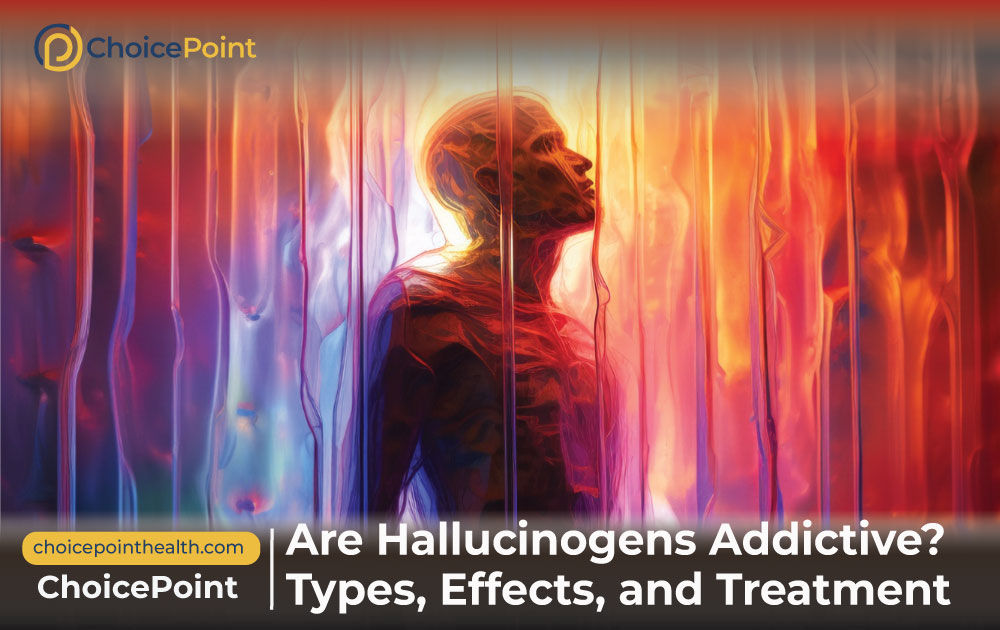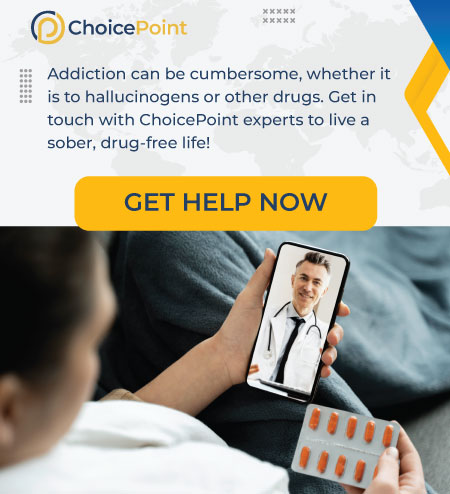Hallucinogen use in the past year was 8% among adults. That was significantly higher than the last five years of combined use. Historically, these were used only for religious rituals and medicinal purposes. But, recent times have seen drastic recreational misuse of hallucinogens. As mind-altering drugs, hallucinogens often pose questions for their users about whether “are hallucinogens addictive” or not. This blog defines hallucinogens, their addictive pattern, and how a person can get hallucinogen addiction treatment.
ChoicePoint offers personalized hallucinogen detox along with behavioral therapies. Get in Touch 844.445.2563 to avoid fatal consequences.
Table of Contents
Hallucinogens: What Do Psychotic Drugs Hold?
Hallucinogens are diverse substances that alter a person’s perception, mood, and thinking behavior. They make an imaginative world for the person that is not real. Hallucinogens are derived from mushrooms or plants or created synthetically in laboratories by man. There are many kinds of hallucinogens having varying effects on the brain and body.
Types of Hallucinogens and Their Effects
Most hallucinogens are entitled to Schedule 1 drugs under the Substance Control ACT as they are not considered fit for medicinal purposes. Hallucinogens are broadly classified into two main categories that are generally misused for addiction purposes. A third category of dileriants is derived from dissociative drugs.
1. Classic Hallucinogens (Psychedelics)
These drugs alter mind perception, causing extreme thinking behaviors that are often not real. These drugs include:
- LSD (Lysergic acid diethylamide) synthetic drug that produces visual and auditory hallucinations along with altered time and reality perceiving.
- Psilocybin (Magic Mushrooms), a natural material in mushrooms, produces similar effects to LSD in lower intensity.
- Bath Salt is a combination of synthetic stimulants causing bizarre and disturbing behavior such as demon-seeing.
- Ecstacy (MDMA/ Molly) synthetic drugs are often considered both a stimulant and hallucinogens, causing euphoria, empathy, and heightened energy.
- Peyote/ Mescaline is a natural substance that gives an altered experience of body and space images often associated with spiritual changes.
- DMT (Dimethyltryptamine) is a natural substance that produces psychedelic effects such as bright colors and unreal body experiences.
- Marijuana (Cannabis) is a natural substance that causes mind, mood, memory, and cognition changes.
They affect the brain’s serotonin, which is involved in mood, perception, sleep, and other behavioral functions.
2. Dissociative Hallucinogens
These drugs make a person detached from themselves and the outside world. Dissociatives include:
- Phencyclidine (PCP) is a synthetic drug that produces numbness, detachment from self, loss of coordination, and aggressive behavior.
- Ketamine synthetic drug causing death-like experiences and hallucinations
- Dextromethorphan (DXM) is a synthetic substance found in cough and cold medicines, causing distortion, dissociation, and euphoria.
- Salvia is a natural substance that causes short-term intense hallucinations of being somewhere else than in reality.
Combined, These drugs affect the brain’s chemical glutamate in learning, memory, emotions, and pain perception.
3. Deliriants
Hallucinogens that make a person lose control and produce confusion and delirium are termed deliriants. They include:
- Antihistaminics
- Atropine
- Henbane
- Mandrake
- Belladonna
These drugs are a special class of dissociative drugs that are involved in states like delirium, hyperactivity, and dream-like hallucinations. They cause less severe effects, but high doses may produce the same as classic hallucinogens.
Are Hallucinogens Addictive? Spot Symptoms for Early Intervention
Hallucinogens, being psychoactive, mainly play with the mind and its working patterns. They are generally not considered physically addictive but cause severe psychological dependence and addiction if usage is prolonged. Addiction is a chronic brain disease, and hallucinogens severely impact brain cognitive functioning while making a person completely dependent on them.
Symptoms of a hallucinogen use disorder (addiction) may vary from person to person and depend on:
- Type of hallucinogen used
- Genetic
- Environmental factors
Usage duration altogether affects hallucinogen addiction in a person with varied symptoms and side effects.
Effects of Hallucinogen Misuse
Individuals seeking answers are hallucinogens addictive might look into the effects that hallucinogens pose due to short or long-term use. Depending on the hallucinogen use disorder, we classify these symptoms into three broad terms.
a. Mental Symptoms
Mental effects may vary according to the type of hallucinogen used, but generally, they show:
- Euphoria
- Intense relaxation
- Hallucinations
- Confusion
- Disorientation
- Anxiety
- Paranoia
They are not limited and may include a combination of symptoms. Hallucinogens often trigger a mental illness that may complicate the effects of their use.
b. Physical Symptoms
Although physical effects of hallucinogens are rare, they pose serious consequences if they persist for a long term, such as:
- Loss of coordination
- Increased breathing and heart rate
- High blood pressure
- Palpitation
- Nausea and vomiting
- Fever
- Chills
- Dizziness and blurred vision
- Sweating
- Numbness
The only way out is to consult a rehab that examines and dispenses medications to alleviate these symptoms accordingly.
c. Psychosocial Symptoms
The most common and early signs that hallucinogen users show are depicted below:
- Dissociative state
- Drug-seeking behavior
- Distorted sense of time and space
- Having difficulty in stopping the use of hallucinogens
- Seeing and talking to things that are not real
- Manic laughter in public
- Legal, family, and accidental issues
Moreover, hallucinogen misuse may trigger underlying mental illnesses or cause new ones, such as:
- Anxiety
- Depression
- Schizophrenia
- Post-traumatic stress disorder
- Bipolar disorder
To ease such unpleasant consequences, psychotherapy and counseling play an important role and are only possible under drug rehab specialists experienced in treating such symptoms.
The Risks of Hallucinogen Withdrawal Without Expert Help
Hallucinogen withdrawal symptoms can give the perfect guess as to whether a person is addicted to hallucinogens or not. The onset of these symptoms may be right away after the initial dose is removed from the body or takes time, usually in the case of people with mental illness.
- Panic attacks
- Speech problems
- Severe mood swings
- Seizures and tremors
- Elevated blood pressure and heart rate
- Headaches
- Sweating
- Drug cravings
- Fluctuating temperature
- Nausea and vomiting
- Agitation and mood swings
- Stiff, spasming, or aching muscles
- Slow and shallow breathing
- Anxiety or depression
- Suicidal ideations
- Psychosis
Long-term hallucinogens may give rise to severe mental illness such as persistent psychosis, in which a person experiences psychosis when they stop using hallucinogens and gets persistent flashbacks of past trauma.
The only way out of the quagmire of these deceptive drugs is to consult a rehab that offers mediation, psychotherapy, and counseling under DEA-certified practitioners and psychiatrists! 844.445.2563.

Effects of Hallucinogens
Treatment for Hallucinogens Addiction: Tapering Psychotic Dependence
Are Hallucinogens Addictive? Yes, Get help today. Treatment for Hallucinogens addiction mainly involves dispencing a combination of therapy and medications. But for the most part, it includes behavioral therapy and counseling, as the brain is severely affected by long-term hallucinogen dependence.
Certain elements of hallucinogen addiction treatment include:
Dual Diagnosis: Determining Severity of Hallucinogen Use Disorder
As hallucinogens affect the brain the most, the hallucinogen use disorder (HUD) often comes with mental illness or triggers each other. Dual diagnosis aims at
- Initial examination of the severity of addiction.
- Accessing a person for potential comorbid conditions, i.e., mental illness and (HUD).
- Arranging a dual diagnosis treatment program for comprehensive sobriety achievement.
Check yourself with a free assessment and get in touch [direct] with experts to discuss where you fall!
Hallucinogen Detox: Preventing Withdrawal Symptoms With Medications
Beginning the rehab process, the most effective way to ease withdrawal symptoms is to detox while staying under 24/7 expert observation. Practitioners will relieve the body from hallucinogen toxication and may dispense the following FDA-approved medications
Currently, there are no government-approved medications specifically available for hallucinogen use disorder. Treatment is based on individual symptoms, and the above medications are potent in treating all sorts of withdrawal symptoms from drugs.
Behavioral Therapy: A Solution for Mind-Altering Drug
The best way to safely withdraw from hallucinogen misuse is psychotherapy. They may include:
- Cognitive Behavioral Therapy (CBT) is related to cognitive abilities and improving thinking patterns.
- Dialectical Behavior Therapy (DBT) is related to CBT to alleviate emotional and behavioral disturbances due to hallucinogen misuse.
Combined, these therapies treat all mental illnesses and withdrawal symptoms that persist due to hallucinogen use disorder.
Personal Development With Counseling to Avoid Future Relapse
The only way to treat the psychosocial effects of hallucinogen use disorder is through professional addiction counseling. This can be performed in three different ways:
Psychiatrists will guide them through one-on-one sessions and the inclusion of family members and peer fellows at the rehab to help them alleviate social anxiety and grow confidence in themselves to avoid unpleasant interactions that lead to relapses.
Hallucinogens Addiction Treatment at ChoicePoint
Hallucinogens are addictive; seeking treatment is the first step toward sober living. ChoicePoint offers psychiatrist-oriented rehab for hallucinogen addiction treatment. We offer personalized care for
We can help you achieve your sobriety goals through our variety of addiction treatment levels:
- Inpatient
- High-intensity outpatient/Partial hospitalization
- Outpatient
- Telehealth
Verify your insurance and begin living in the real world without delusions and inconvenience 844.445.2563.
Can You Get Addicted to Hallucinogens?
Are hallucinogens addictive or not? You get the most important information. Some of the other common questions people ask about hallucinogen addiction are:
How Long Do Hallucinogens Effect Last?
The hallucinogen effect duration depends on the following:
- The type of hallucinogen drug used
- Quantity of drug
- Individual biological factors (age, health, weight)
- The type of sample obtained for testing (hair, urine, blood, etc.)
But usually, peak hallucinogen effects can range anywhere from the starting hour of consumption to up to 12 hours.
How Long Do Hallucinogens Stay in Your System?
For testing purposes, hallucinogens may last in your system as:
- Urine: 2 to 4 days after initial use
- Blood: 6 to 12 hours after the last use
- Hair: for up to 90 days
What Happens in a “Bad Trip”?
When someone experiences negative effects that last longer than usual, it is termed as a bad trip that includes:
- Unpleasant/intense hallucinations
- Intense fear
- Paranoia
- Anxiety
- Panic
- Drug-induced psychosis
- Dangerous and life-threatening behavior
These occurrences are quite unpredictable, and one should seek immediate help if experiences such symptoms 844.445.2563
What Is the Difference Between Hallucinogens and Stimulants?
Hallucinogens mainly affect your senses and change how a person sees, feels, hears, and touches things that are usually unrealistic. Stimulants act on the central nervous system by boosting its activities, causing euphoria and fast heart and breathing rates.
Can Hallucinogen Misuse Lead to Overdose?
Hallucinogen overdoses are fatal and may cause:
- Depressed breathing
- Seizures
- Coma
- Death
Seek immediate help if you feel any 844.445.2563.
How Do Hallucinogens Interact With Other Drugs or Substances?
Mixing hallucinogens with other drugs, such as cocaine and meth, increases the “high” effect and may cause increased heart rate with breathing problems. Mixing it with alcohol puts the user in a state of trance that is difficult to overcome. Overall, mixing hallucinogens with other substances is extremely dangerous and leads to fatal consequences.
Medical Disclaimer:
ChoicePoint aims to improve the quality of life for people struggling with substance use disorder and mental health issues. Our team of licensed medical professionals research, edit and review the content before publishing. However, this information is not intended to be a substitute for professional medical advice, diagnosis, or treatment. For medical advice please consult your physicians or ChoicePoint's qualified staff.











I loved you better than you would ever be able to express here. The picture is beautiful, and your wording is elegant; nonetheless, you read it in a short amount of time. I believe that you ought to give it another shot in the near future. If you make sure that this trek is safe, I will most likely try to do that again and again.